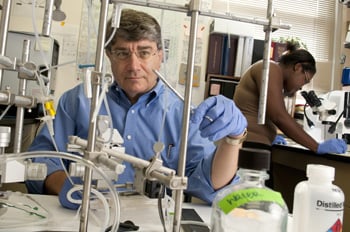Focusing on Concrete Health Improvements

Feature shot on story page: Professor Julian Solway, MD, conducts translational research that seeks to develop new treatments for asthma. Jasmin Nixon, summer student from Chicago State University (left) visiting on a CTSA-supported laboratory experience training program, assists. Photo by Lloyd DeGrane
A university-wide emphasis on translational research fostered during the past three years by the Institute for Translational Medicine will increase the pipeline of procedures, devices and pharmaceutical agents that UChicagoTech could help researchers to develop into patents and products.
ITM was created in 2007 with a $23-million Clinical and Translational Science Award from the National Institutes of Health; and UChicagoTech is the University of Chicago’s Office of Technology and Intellectual Property.
“These two entities are focusing the attention of university researchers on work that has the potential to improve people’s health in direct, practical ways,” says Julian Solway, MD, Walter L. Palmer Distinguished Service Professor of Medicine and Pediatrics and Associate Dean for Translational Medicine. “There’s a new urgency on campus to this kind of research.”
For years, Solway has been researching ways to interfere with muscle contraction as a novel treatment for asthma. Reflecting the pervasive trend toward multidisciplinary translational research, he recently partnered with Margaret Gardel, PhD, Assistant Professor of Physics at the University, and Jeffrey Fredberg, PhD, Professor of Bioengineering and Physiology at Harvard, in applying for an NIH grant to conduct a drug screening to find lead compounds that might prevent the formation of contractile filaments in muscles. “The emphasis from ITM and UChicagoTech on real, deliverable therapies encouraged me to take this research to this next level,” Solway says.
“ITM’s capabilities have become increasingly important as UChicagoTech has accelerated its work with investigators to move new inventions coming out of basic research onto a commercial trajectory,” says David Tiemeier, PhD, Deputy Director of UChicagoTech. “And, that will increase as we attempt to build an Innovation Fund that could provide $50,000 to $100,000 for proof-of-concept studies.”
Supporting translational research
The main service ITM and its partners provide researchers is infrastructure support: expert advice on bioinformatics, biostatistics, study design, comparative effectiveness, ethics, epidemiology, the regulatory process and community engagement. It also offers networking opportunities and supports patient studies with procedures and nursing and lab services.
“We try to stimulate multidisciplinary translational and clinical research collaborations by awarding pilot project seed grants,” Solway explains.
“This is a simple, elegant solution to a major problem in robotics,” says Sean Sheridan PhD, Project Manager at UChicagoTech. “As robots become more common, this technology will have many potential applications in industry, medicine, and the military.”
In addition, ITM promotes training by supporting the masters program in clinical research; offering courses (undergraduate through faculty); providing competitive stipends to graduate students and salary support for faculty members; and working with community partners in outreach programs.
“Everything we do is focused on improving human health as directly as possible,” Solway says. “It’s wonderful to see increased collaboration and multidisciplinary research. ITM did not create or start these forces, but it’s an engine that has greatly enhanced them.”
By Greg Borzo
*UChicago Tech is now the Tech Commercialization team at the Polsky Center for Entrepreneurship and Innovation in recognition of a $50M gift from Michael Polsky in 2016 to expanded the Polsky Center in order to unify and enhance UChicago’s leading venture creation initiatives. Learn more about this transformational gift. >>